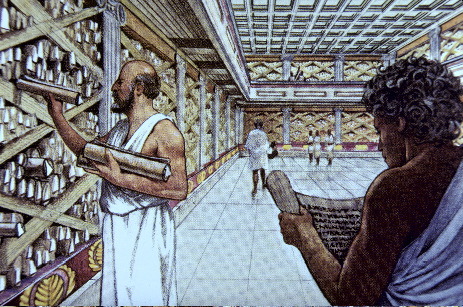This is my final post and I will be summarising all of my research findings.
The subject I had chosen was the ancient world and I chose four different subjects to research. The four subjects I chose were, clay tablets as library materials, The Dead Sea Scrolls, the spread of the original alphabet and its adaptation by various peoples around the world and Papyrus scrolls as library materials. The were very interesting to research and I found many great materials about each of them.
Clay tablets as library materials
First I researched clay tablets as library materials and I found one website with a lot of information, a Youtube video that was quite interesting and a great picture of one of the tablets from the website. The last week I made a post with one item for each subject I chose. I found a book about the tables and the picture is of the book.

Nicole Silvester, 2009, Clay tablets as books, glam media, viewed27th August 2012 , <http://suite101.com/article/clay-tablets-can-be-books-too-a155685 >
rewilkins2, The Epic of Gilgamesh (1/11), 28th February, viewed 30th August 2012, <http://www.youtube.com/watch?v=pxPhk84TTnw >

Mitchell, S. 2004, Gilgamesh : a new English version, Free Press, New York.
The Dead Sea Scrolls
The second topic I researched was The Dead Sea Scrolls, I found a great book about the scrolls, another Youtube video and a picture of one of the scrolls I found on Google. For the last week I found a website about the scrolls, the picture is also off the website.

Burrows, M, 1955, The Dead Sea scrolls. With translations by the author, Viking Press,New York
Google, The Dead Sea scrolls online, 23rd September, viewed 2nd September 2012, <http://www.youtube.com/watch?v=5rYj_0foJYA>

ipl 2012, Dead Sea scrolls 2012, The Orion Center, viewed 1st October 2012 , <http://orion.mscc.huji.ac.il/>
The third topic I researched was the spread of the original alphabet and its adaptation by various peoples around the world. I found a subject directory, a Youtube video and a picture I found on the website provided. For the last week I found a podcast about the original alphabet.

G. NS 28th August 2012
TheYizhaqBenAvraham, The Original Hebrew Alphabet, 5th April, viewed 1st September 2012, < http://www.youtube.com/watch?feature=player_embedded&v=qj0v-qJhjlo>
Yahoo 2012, the original alphabet podcast, the psych files, viewed1st October 2012 , <http://www.thepsychfiles.com/2009/05/episode-96-video-mnemonics-advanced-the-pegword-system-part-2/>
The Papyrus scrolls
The last subject I researched was the Papyrus scrolls, I found a few different Britannica references, a podcast which was interesting and a picture of one of the scrolls from the Britannica pages. For the last week I found a subject directory website, the picture is also from that website.

Encyclopedia Britannica 2012, Rhind papyrus, Encyclopedia Britannica, viewed15th September 2012 , <http://www.britannica.com.ezproxy.lib.swin.edu.au/EBchecked/topic/501277/Rhind-papyrus>
Encyclopedia Britannica 2012, Ebers papyrus, Encyclopedia Britannica, viewed 15th September 2012 , <http://www.britannica.com.ezproxy.lib.swin.edu.au/EBchecked/topic/177583/Ebers-papyrus >
2012 , <http://www.rom.on.ca/media/podcasts/display.php?id=77 >

The New York Times Company 2012, Papyrus scrolls, About, viewed1st October 2012 ,<http://ancienthistory.about.com/gi/dynamic/offsite.htm?site=http%3A%2F%2Fwww.nathanielturner.com%2Fwritinghistory.htm>
In conclusion, I thought this was an interesting project. I came across a few different obstacles but I think that I managed to find enough relevant items about each subject; you can really find anything on the Internet. I found using a search engine was the best way to find any source as it has so many return results. Hope you all enjoyed reading!
The subject I had chosen was the ancient world and I chose four different subjects to research. The four subjects I chose were, clay tablets as library materials, The Dead Sea Scrolls, the spread of the original alphabet and its adaptation by various peoples around the world and Papyrus scrolls as library materials. The were very interesting to research and I found many great materials about each of them.
Clay tablets as library materials
First I researched clay tablets as library materials and I found one website with a lot of information, a Youtube video that was quite interesting and a great picture of one of the tablets from the website. The last week I made a post with one item for each subject I chose. I found a book about the tables and the picture is of the book.

Nicole Silvester, 2009, Clay tablets as books, glam media, viewed
rewilkins2, The Epic of Gilgamesh (1/11), 28th February, viewed 30th August 2012, <http://www.youtube.com/watch?v=pxPhk84TTnw >

Mitchell, S. 2004, Gilgamesh : a new English version, Free Press, New York.
The Dead Sea Scrolls
The second topic I researched was The Dead Sea Scrolls, I found a great book about the scrolls, another Youtube video and a picture of one of the scrolls I found on Google. For the last week I found a website about the scrolls, the picture is also off the website.

Burrows, M, 1955, The Dead Sea scrolls. With translations by the author, Viking Press,


Yahoo 2012, the original alphabet podcast, the psych files, viewed
The Papyrus scrolls
The last subject I researched was the Papyrus scrolls, I found a few different Britannica references, a podcast which was interesting and a picture of one of the scrolls from the Britannica pages. For the last week I found a subject directory website, the picture is also from that website.

Encyclopedia Britannica 2012, Rhind papyrus, Encyclopedia Britannica, viewed

The New York Times Company 2012, Papyrus scrolls, About, viewed
In conclusion, I thought this was an interesting project. I came across a few different obstacles but I think that I managed to find enough relevant items about each subject; you can really find anything on the Internet. I found using a search engine was the best way to find any source as it has so many return results. Hope you all enjoyed reading!
